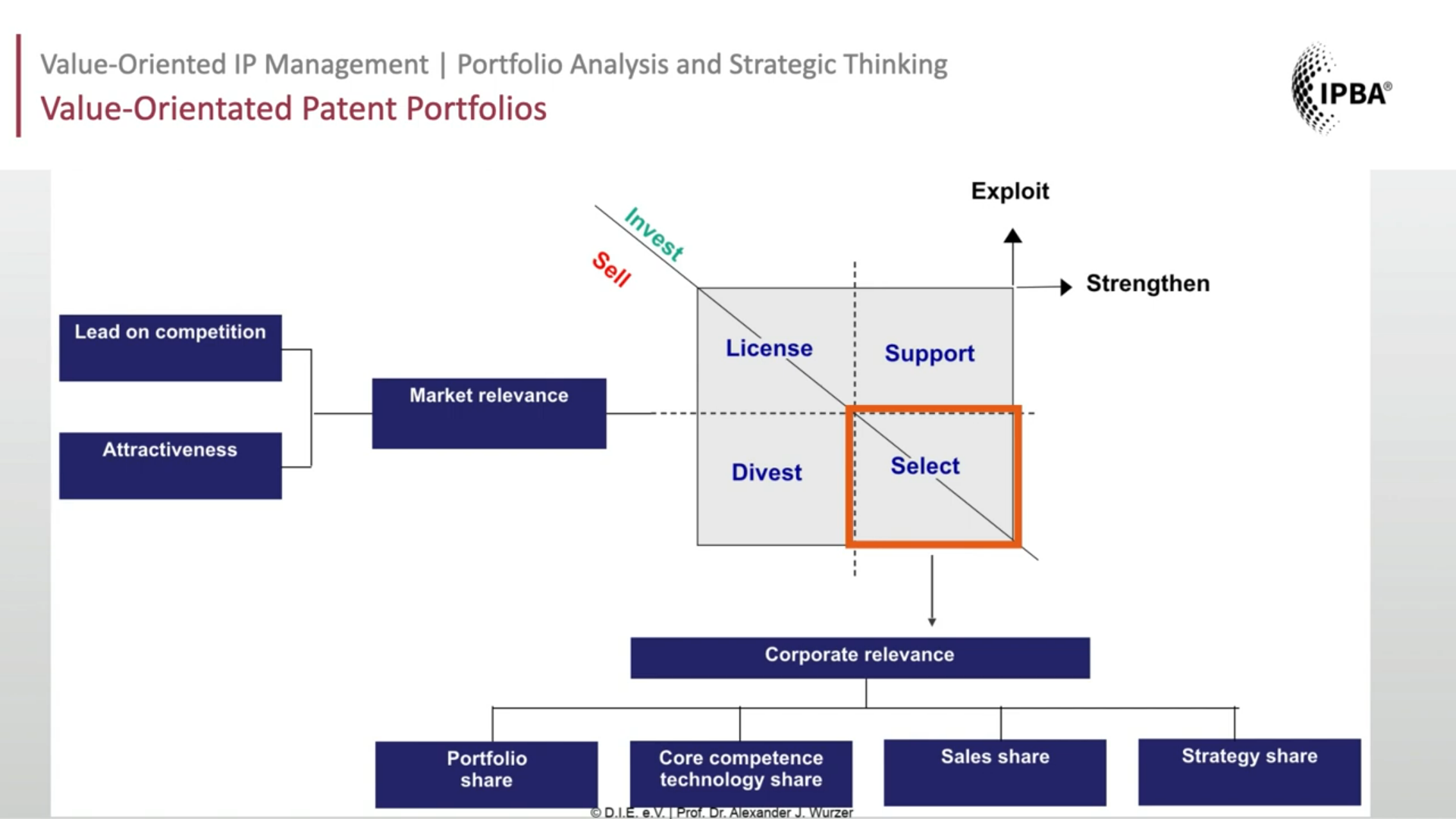
On 30.01.2025, Maucher Jenkins organizes a hybrid IP day for audiences in Basel and online about the current practice in IP portfolio management👉 Strategic management of diverse assets to optimize returns and balance risk. and patent👉 A legal right granting exclusive control over an invention for a limited time. valuation. The event starts at 10 am with a presentation about current trends in value-oriented patent portfolio management by Prof. Dr. Alexander Wurzer followed by presentations on decision making👉 The process of choosing the best option among alternatives. regarding patent costs by Jan Thorsten Weber and patent valuation in the pharmaceutical industry by Dr. Alexander Wagner in the afternoon until 4 pm. The event will be held in German language and you can register here for on-site and online participation.
The digital transformation has upended traditional business models and accelerated the pace of innovation👉 Practical application of new ideas to create value. across all sectors. This rapid evolution presents both challenges and opportunities for managing patent portfolios effectively. In this era of disruption, a value-oriented approach to patent portfolio management is essential for maximizing returns and ensuring alignment with business objectives.
Digital Transformation and Patent Portfolio Management
The digital age has brought about several key changes that impact patent portfolio management:
- Increased Competition👉 Rivalry between entities striving for a shared goal or limited resource.: Technology is evolving rapidly, and new players are constantly entering the market. This intensifies the need for strong patents to secure a competitive edge.
- Shorter Product Lifecycles: The pace of innovation means that products become obsolete faster. This necessitates a more dynamic approach to patenting, with a focus on emerging technologies and future trends.
- Data-Driven Decision Making: Data analytics and AI tools are transforming how businesses operate. This also applies to patent management, where data can provide valuable insights into patent value👉 Economic benefit derived from a patent's use., competitive landscapes, and technology trends.
- New Business Models: The rise of digital platforms, subscription services, and the sharing economy requires a rethinking of traditional IP strategies. Patents need to be aligned with these new models to ensure effective protection and monetization.
For more information on Value-orientated Patent Portfolio Management, please watch the following video:
Further information
📝 IP Business Academy Blog:
Open Innovation Paradigm at Microsoft – Burning the Ships by Marshall Phelps
📝 IP Business Academy Blog:
Patent Portfolio Management by Simone Frattasi and Jean-Claude Alexandre Ho
🎧 IP Management👉 Strategic and operative handling of IP to maximize value. Voice Podcast:
Episode #3 AI supported patent application tools – featured content by Sebastian Göbel
🎯IP Management Pulse Newsletter:
#7 Value driven IP strategies
🔗dIPlex:
IP Valuation
Patent Cost Optimization in the Digital Age
The digital transformation has undoubtedly impacted patent cost optimization. While the costs associated with obtaining and maintaining patents remain significant, new tools and strategies are emerging to help manage these costs more effectively.
- Strategic Portfolio Pruning: Regularly reviewing and pruning your portfolio is crucial to eliminate low-value patents and focus resources on those with the highest potential return. Data analytics can help identify patents that are no longer aligned with business goals or have limited commercial value.
- Leveraging Technology: AI-powered tools can automate many aspects of patent management, such as prior art searching, patent drafting, and portfolio analysis. This can significantly reduce the time and costs associated with these tasks.
- Open Innovation and Collaboration: Strategic partnerships and open innovation models can help share the costs of research and development, reducing the financial burden on individual companies.
Further information
🔗dIPlex:
What can be Protected by IP Strategies
📝 IP Business Academy Blog:
Portfolio analysis and the patent life cycle
🎯IP Management Pulse Newsletter:
#5 Competition is not always a zero sum game
Communicating Patent Value to Business Decision Makers
Traditionally, patents have been viewed as legal documents rather than valuable business assets. However, in the digital age, it’s crucial to communicate the value of patents to business decision makers to ensure informed decision-making and secure buy-in for IP strategies.
- Focus on Business Outcomes: Frame patent value in terms of its impact on business objectives, such as increasing market share, generating revenue, or attracting investment.
- Use Data and Analytics: Present data-driven insights on patent value, competitive landscapes, and technology trends to support your recommendations.
- Develop Key Performance Indicators (KPIs): Track and measure the performance of your patent portfolio using relevant KPIs, such as licensing👉 Permission to use a right or asset granted by its owner. revenue, number of inventions protected, or return on investment.
- Tell a Story: Use compelling narratives and case studies to illustrate the value of patents and how they contribute to business success.
- Speak Their Language: Avoid technical jargon and communicate in a clear and concise manner that resonates with business leaders.
Further information
📝 IP Business Academy Blog:
Value-Oriented IP Management: Unlocking the Potential of Intellectual Property Assets
🎧 IP Management Voice Podcast:
Episode #1 Leveraging IP Benchmarking for C-Level Communication – featured content by Dominique Christ
📝 IP Business Academy Blog:
Putting the IAM function at the heart of corporate strategy: A review
📝 IP Business Academy Blog:
Patent Value and Patent Quality
AI Tools for Optimizing Patent Portfolio Value
Artificial intelligence is rapidly transforming the field of patent management, offering powerful tools to optimize portfolio value and streamline processes.
- Patent Valuation: AI algorithms can analyze various data, such as patent citations, market data, and litigation history, to provide more accurate and more objective patent valuations.
- Competitive Intelligence: AI-powered tools can monitor competitor activity, identify emerging technologies, and provide insights into the competitive landscape.
- Portfolio Optimization: AI can help identify patents with the highest potential value, prioritize patent filings, and optimize portfolio strategy based on business objectives.
- Risk Management👉 Process of identifying, assessing, and controlling threats to assets and objectives.: AI can assess the risk👉 The probability of adverse outcomes due to uncertainty in future events. of patent infringement, identify potential litigation threats, and help develop mitigation strategies.
- Automation: AI can automate time-consuming tasks such as prior art searching, patent drafting, and translation, freeing up IP professionals to focus on more strategic activities.
Further information
🎧 IP Management Voice Podcast:
Episode #7 AI-assisted invention processes – featured content by Daniel Holzner
🔗dIPlex:
Patent Portfolio Analysis
🔗dIPlex:
Streamlined patent drafting processes by Daniel Holzner
📝 IP Business Academy Blog:
Understanding Patent Value: Insights from the Handbook of Patent Valuation
By embracing a value-oriented approach and leveraging the power of AI, businesses can navigate the challenges and capitalize on the opportunities presented by the digital transformation. A well-managed patent portfolio can be a powerful asset for driving innovation, securing a competitive edge, and achieving long-term success in the digital age.
Current event
To raise awareness of the business relevant topics of value-oriented patent portfolio management and patent valuation, the law firm Maucher Jenkins organizes on Thursday, 30 January 2025, in their Basel office and online an IP day with presentations by expert speakers.
You can find more information and an overview of the program here:
